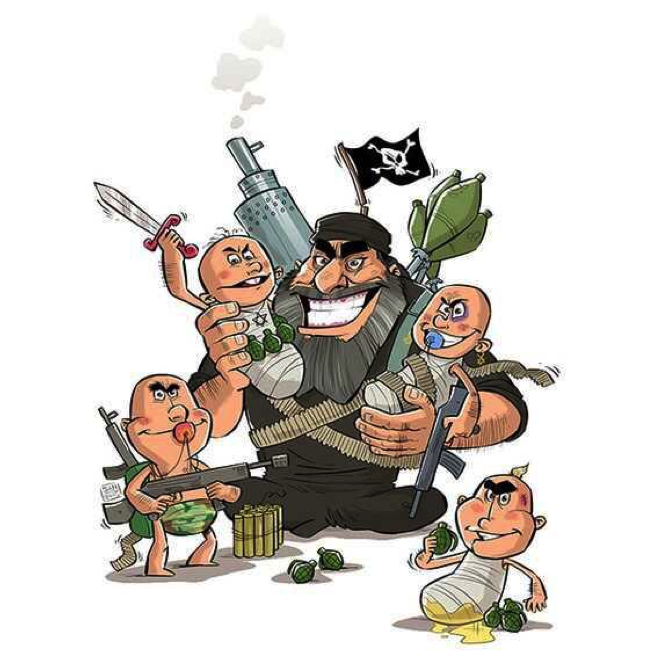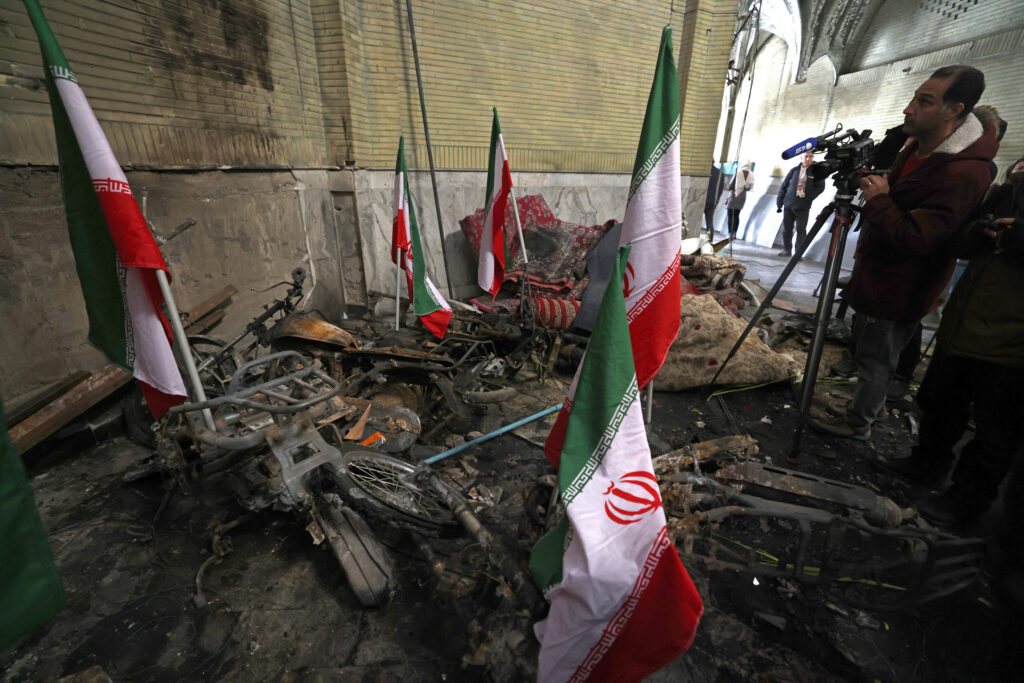By Charlotte Schriwer
It is by now well known that the extremist jihadi group known as Islamic State, or ‘IS’ in short, has gained widespread infamy as a result of its sophisticated and attractive online social media campaigns- campaigns that have convinced swathes of impressionable youths across the globe into joining its cause. The glorification and romanticisation of a battle against the ‘Infidel West’ and the formation of a new caliphate with only one khalifah to rule the world has taken many forms- the promise of paradise, the release of a hauntingly and hypnotically addictive anthem, or nasheed (although, as pointed out, it is strictly not so, as anthems are a concept of ‘the West'[1]) called ‘Ummati qad laha fajrun’ (My Ummah, Dawn Has Appeared’), and the lure of eternal life through martyrdom. A number of social media analysts have suggested that Islamic State’s savvy and popular media campaign is at the heart of its lure and scare tactics, some even comparing the skill of the visual effects to the mastery of Hollywood movie making.[2] The purpose is to drive fear and intimidation into the hearts of the enemy, and to recruit its ummah (people) for the cause, and, until recently, it has been working quite well.
In the past year, a number of activists and governments have responded to IS’ media campaign of fear, but not through violence, scare tactics or conventional weapons. The weapon of choice is popular culture, frequently involving a whole-hearted and full-fledged mockery of a group that has become globally synonymous with hatred, intolerance and destruction. From as far East as Japan to as far West as California- through art, literature, music, performance, film- all pastimes which are strongly prohibited under the strict shari’a law that IS is enforcing in the territories it is currently trying to control- Islamic State and its cruelty have become a target of global mockery. ┬áAnd, it appears that this mockery begins at home- not in the ‘West’, but in countries that practice more conservative forms of Islam, such as Saudi Arabia.
According to statistics, Saudi Arabia has provided Islamic State with the highest number of jihadis along with Jordan, Tunisia and France,[3] and as a response, artists and comedians have launched their own offensive against the extemist group through various media, but in particular film. The Saudi comedian Meshal al-Jaser produced a music video entitled ‘Screw Infidels’, in which he- dressed in colourful shorts and t-shirt, fancy sneakers and accessories in the stereotypical gangster-rapper style, roams a Los Angeles neighbourhood searching for people who disregard his strict vision of Islam. His antics include harrassing a boy giving his teacher an apple (suggesting the boy should not be so generous), assaulting a male jogger who is not wearing a shirt, slapping a fellow Muslim for being too tolerant of non-Muslims, and urinating in the pool at an ‘infidel’ pool party. The four- minute long bizarre and comedic show is a clear parody of the constant and extreme social media propaganda that Islamic State delivers on a daily basis to ensnare would-be jihadists, which al-Jaser mocks by repeating that Islam must not be ‘melty like ice cream’.[4] Using similar tools of mockery, although very dark, another Saudi artist, the well-known actor Nasser al-Qasabi, has received death threats from ISIS for his sketch comedy series ‘Selfie’, where he poses as a somewhat inept Islamic State fighter. [5]
An anonymous online activist used video clips of cats to mock Islamic State. In a compilation featuring about 30 clips of different cats in failed attempts to jump from one place to another is run alongside one of Islamic State’s famous nasheed, Saleel al-Sawarim (the clanging of the swords), timed so that the cats fall to the words ‘Allahu Akbar’.[6] This video may perhaps have been a response to the jihadist group’s more recent attempts to ‘humanise’ their cause by creating a twitter account called ‘Islamic State of Cats’, which showed pictures of its fighters feeding and playing with kittens, who were affectionately referred to as ‘mewjahedin’.[7]
Music also plays a vital role in the anti-IS media campaign. The Lebanese group The Great Departed have penned a number of songs that ridicule Abu Bakr al-Baghdadi, one of their most famous being ‘Madad al-Baghdadi’ (‘Onwards, Baghdadi’). The lyrics, which include lines such as ‘And because Islam is merciful, we shall butcher and hand out meat. And because we need to reduce traffic, we will blow up human beings,’ and ‘I swear to God, if I was a cow I would be wearing a bra’, making a reference to Al-Baghdadi’s alleged offense at
the nude and uncovered udders of cows,[8] are set to a fast-paced rhythm of guitar and tambourine music in the style of traditional Arabic folk songs. This is a stark contrast to the slow, mournful and hypnotic non-instrumental tone of the many nasheed Islamic State has created to attract its followers.

A photoshopped image of al-Baghdadi with Angela Merkel, (Photo: http://albaghdaddy.tumblr.com )
While performance arts such as film and music top the list of media employed to ridicule Islamic State, blogs and spoof websites are also a popular method among individuals, particularly those who wish to remain anonymous. In a doubly ironic fashion, the ‘Pan Arabia Enquirer’ (a spoof Arab version of the National Enquirer, one of the most notoriously unreliable tabloid US papers) recently announced that this year’s Turner Prize (arguably the most prestigious contemporary art prize globally) would go to Islamic State. The Pan Arabia Enquirer, whose motto is ‘Spreading the hoummous of satire over the flatbread of news’, awarded the prize for a work called ‘Smashing Mosul Museum to Pieces: Death to the Infidels’, while the leader of IS, Abu Bakr al-Baghdadi, apparently announced the groups newest artistic creation: ‘Beheading the Turner Prize Judges: Death to Anyone Who Looks Suspiciously Homosexual’.[1] According to the Pan Arabian Enquirer, former winners of the prize include the Taliban for their work ‘Blowing Up 30ft High Buddhist Statues: Because They’re Buddhist’, which they were awarded in 2001, one of the many ironies here, of course, being that art and idolatry is strictly forbidden under Islamic State’s and the Taliban’s version of shari’a law; both extremist groups have destroyed a number of the world’s most ancient and revered historic sites and artefacts to make this point.

Japanese meme mocking ISIS, showing Jihadi John invading the world with spaceships while one of his fellow jihadis waves the Islamic State flag.
Groups of anonymous individuals, using Tumblr, Twitter and blogs, also take the opportunity to poke fun at ISIS. The victims are usually not only the extremist group itself as a whole, but more specifically its two most notorious representatives, Jihadi John and Abu Bakr al-Baghdadi. ‘Al-Baghdaddy’, a spoof blog established in the name of al-Baghdadi on the social media site tumblr, has placed both of these infamous figures in satirical scenes involving, among many, al-Bahgdadi in the back seat of a car driven by Janet Leigh in a scene from ‘Psycho’, Jihadi John in embrace with ┬áAyman al-Zawahiri, the current leader of al-Qaeda, confessing that he has finally fallen in love; and at a press conference sharing a joke with Angela Merkel.[1] Further East, in Japan, online bloggers using the Twitter hashtag #ISIS, which roughly translates to ‘ISIS Crappy Photoshop Grand Prix’, began posting thousands of memes mocking Islamic State, often using popular Japanese gaming or cartoon themes as the basis of their tools of ridicule.[2]
In response to ISIS’ Twitter threat that Islamic State would soon arrive in Rome,[3] a large number of Italian Twitter users reacted with sarcastic advice regarding, for example, the bad traffic around certain parts of Rome, which ISIS should bear in mind, and try to avoid, when they plan their arrival. Another reply suggested that ISIS avoid using Francesco Schettino, the captain of the ill-fated Costa Concordia cruise ship that sank off the coast of Tuscany in 2012, to captain its ships when they head for Rome. An overwhelming response also flooded across Twitter globally when the pro-ISIS hashtag #We_Are_Coming_O_Rome threatened to ‘conquer and establish the justice of sharia. We will use your leaning tower of pizza to throw off homosexuals’, with one tweet suggesting ‘You need to tackle the Leaning Tower of Lasagna before you try the Leaning Tower of Pizza’.[4]
Ridiculing Islamic State through creative means is not merely confined to social media or the online realm. In Iraq, artist Akeel Khreef has taken old shoes and turned them into a mural of mock figurines of ISIS fighters. Khreef’s intention is to portray the ugliness of the jihadists by creating portraits of them out of worn out shoes- a double insult, as it is particularly offensive in Iraq to call someone a waja al-kundara (shoe-face).[5] More recently, Iran also responded to the threat of ISIS by officially hosting a cartoon competition demonstrating the group’s extremist methods. The Iranian state-sponsored ‘International Daesh Cartoon and Caricature Contest 2015′ received more than 800 entries from across the globe, many of which did not only satirise the brutality of ISIS, but also engaged in suggesting the alleged involvement of the United States and Israeli governments in the establishment of the extremist group. [6]
As the anti-IS popular culture campaigns of mockery and ridicule continue to gain strength-which undoubtedly they will with social media and pop culture battles raging across the internet-it seems clear that the online war agains Islamic State is enjoying more success than the war on the ground. While the United States has launched its own anti-IS social media campaign, and Europol has established a new department to infiltrate and block social media accounts used by IS, the extremists- although starting to show signs of cracking- are currently still ahead in terms of its cunning use of social media. Despite rapid take-down rates of IS-linked social media accounts by individual hackers and government agencies, IS continues to successfully recruit new mujahedeen via online mechanisms; rather than compete with each other, online activists, hackers and governments must therefore work together to stay one step ahead of the game to reduce IS’ persuasive ability to recruit new members online. And as more artists and activists take up the battle in the online sphere, eventually, it may be the only way of successfully fighting what looks to be a long-term global battle against extremist ideologies.

Cartoon of IS leader  Abu Bakr Al-Baghdadi, entered for the Daesh International Cartoon Festival in Iran (Artist: Mohammadreza Akbari, Iran; Photo: Twitter)
Charlotte Schriwer’s research has focused mainly on the history of the Levant, (Jordan, Syria, Lebanon), in particular on its agricultural history from the 12th century to the 1800s. She has also explored the question of ethnic identity in the Ottoman architecture of the Levant. Since joining MEI in 2011, she has started a project documenting the history of protest art in the Arab world, with a focus on the Arab Uprisings. She holds a PhD in History and an MA in Middle East Studies from the University of St Andrews, Scotland, and an MA in Islamic Art and Archaeology from the School of Oriental and African Studies in London. Charlotte Schriwer co-edited Converging Regions: Global Perspectives on Asia and the Middle East (2014) with Nele Lenze.
[1] http://albaghdaddy.tumblr.com.
[2] https://boingboing.net/2015/01/23/japanese-twitter-users-mercile.html ; accessed August 27, 2015.
[3] ‘Rome’ or ‘Rum’ can refer to the general ‘West’ rather than the city of Rome itself.
[4] Thom Senzee, ’15 Snarkiest Responses to ISIS Threat of Roman Invasion’, February 26, 2015; http://www.advocate.com/world/2015/02/26/15-snarkiest-responses-isis-threat-roman-invasion ; accessed June 25, 2015.
[5] Ammar Karim, ‘Iraqi Artist embarasses Islamic State Jihadists- with old shoes’, Your Middle East, January 30, 2015; http://www.yourmiddleeast.com/culture/iraqi-artist-embarrasses-islamic-state-jihadists-with-old-shoes_29566 ; accessed June 25, 2015.
[6] Sarah Judith Hoffman and Parsa Bayat, ‘Iran Battles its Enemies With Cartoons’, https://en.qantara.de/content/exhibition-of-is-cartoons-in-tehran-iran-battles-its-enemies-with-cartoons ; accessed August 25, 2015. For the full exhibition catalogue, visit http://www.irancartoon.com/tag/daesh.
[1] ‘The Islamic State wins prestigious Turner Prize for modern art’, March 3, 2015; http://www.panarabiaenquirer.com/wordpress/islamic-state-wins-prestigious-turner-prize-modern-art/; accessed June 24, 15.
[1] Alex Marshall, ‘How ISIS got its Anthem’, The Guardian, Sunday, November 9; http://www.theguardian.com/music/2014/nov/09/nasheed-how-isis-got-its-anthem; accessed June 19, 2015.
[2] Steve Rosen, The Isis Propaganda War: A hitech media jihad, The Guardian, October 7, 2014, http://www.theguardian.com/world/2014/oct/07/isis-media-machine-propaganda-war; accessed June 19, 2015.
[3] Louisa Loveluck, ‘Islamic State, One Year On: Where Do Its Fighters Come From?’ The Guardian, June 8, 2015; http://www.telegraph.co.uk/news/worldnews/islamic-state/11660487/Islamic-State-one-year-on-Where-do-its-fighters-come-from.html ; accessed June 25, 2015.
[4] Sean Foley, ‘Saudi Arabia Feature: The ‘Screw Infidels’ video mocking the Islamic State;’ http://eaworldview.com/2015/05/saudi-arabia-feature-the-screw-infidels-comedy-video-mocking-the-islamic-state/ ; accessed June 25, 2015.
[5] http://www.bbc.com/news/blogs-trending-33228691 ; accessed August 25, 2015.
[6] Elin Hagerlid, ‘Two Islamic State Fighters Walk Into a BarÔǪHow Arabs are mocking the self-proclaimed Caliphate’, Foreign Policy, April 17, 2015; http://foreignpolicy.com/2015/04/17/two-islamic-state-fighters-walk-into-a-bar-satire-isis/ ; accessed June 25, 2015 (the video has since been removed).
[7] James Vincent, ‘I Can Haz Islamic State Plz: Isis progaganda turns to kittens and lolspeak’, The Independent, 21 August 2014; http://www.independent.co.uk/life-style/gadgets-and-tech/isis-propaganda-on-twitter-turns-to-kittens-and-lolspeak-i-can-haz-islamic-state-plz-9683736.html ; accessed August 25, 2015.
[8] Robert Mackey, ‘Mocking ISIS in Beirut’, http://www.nytimes.com/2014/09/11/world/middleeast/mocking-isis-in-beirut.html?_r=0 , accessed August 25, 2015.





